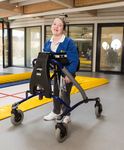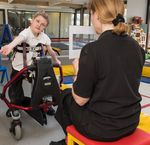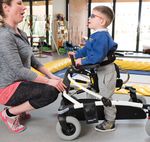R82 Mustang The walking aid that adapts & develops with you - Workbook | Mustang - R82 UK
←
→
Page content transcription
If your browser does not render page correctly, please read the page content below
Junior | Walking
What is Mustang? Positioning Options
Mustang is a highly adaptable walking aid for and/or trunk and pelvis support (GMFCS 3-5 Mustang can be used with anterior or posterior support depending on the stage of the
children and young adults. It can be configured in CP) to users fully weight bearing with less child’s walking development.
with anterior or posterior support to meet a need for postural support (GMFCS 2-3 )
range of walking needs.
This interactive workbook with contributions
It provides excellent and snug support for the by Frances George, Highly Specialist
Walking with Anterior Support
upper body whilst keeping the child’s pelvis Physiotherapist, takes a detailed look at This position is best suited for children in the early
gently supported. The upright, slightly forward, Mustang including different positioning options stages of walking , those who are not able to fully
leaning position, stimulates the walking function and how it can be used for different stages of weight bear on their feet, where motor skills are
and encourages the child to participate in daily walking development. It looks at a case study impaired or where support is needed round the
activities. following the progress of 3 year old Tommy and trunk and pelvis.
also includes a look at accessories.
Mustang is designed to assist gait training for a The child is protected in this position and having the
wide range of abilities from those with reduced There are links to clinical research and “how support at the front of the trunk stimulates a more
motor skills or needing some weight bearing to” videos. active extension.
In this position, the Mustang can be tilted forward to
create a prone position. The chest support and seat
move together to keep optimal body alignment and
this forward tilt encourages the child to step forward.
It also offers easy access to the walker.
Frances explains the See a demonstration of the
anterior position in Mustangs forward tilt
more detail.
Walking with Posterior Support
In a this position, the Mustang is suited for
children whose walking skills have developed,
who have more trunk stability, can fully weight
bear and don’t need forward tilt prone position.
Manoeuvrability
Children in the Mustang are close to the centre of When fixed in a straight line the child can focus The open frame makes it possible for the child to
the frame so can turn around their own axis. Many on their steps. As their walking develops, the better access their environment. Not having any-
children with postural asymmetry can have great front wheels can be unlocked to allow move- thing to lean on facilitates a more active posture
difficulty walking straight ahead. Others are weak ment forward and back or all four released to and gives the child more freedom.
so to help them walk, wheels must be low friction. give the child more control.
Swivel wheels allow maximum manoeuvrability
but where the child’s movements are poorly co-
ordinated or on sloping surfaces the directional Find out more about Frances explains the posterior
stabiliser can be used. Also anti-reverse brakes Mustangs configurable wheels. position
keep the Mustang on course.
2 Mustang | Workbook R82 | Nothing Compares to a smile! www.R82.co.uk Mustang | workbook 3Junior | Walking
Mustang - adapts and develops with you
These videos will help to guide you when configuring your Mustang
Walking Principles Targeted Strength Training
The complexity and strength demands of walking are reflected in the length of time it takes Research has shown that the greatest difference in strength between independ-
an infant to start walking and develop a mature gait. ent walkers and children needing walking aids was in the hip abductors and knee
Children with disabilities can have difficulty walking for many reasons and extensors at 30 degrees. These are key muscle groups in sagittal and frontal plane
need to be guided and stimulated in taking first steps. walking ability which have implications in targeting strength training to maximise
Frances explains movement patterns in walking. functional outcome.
N Thompson et al – Muscle Strength and walking ability in Diplegic CP:
Stages of Walking Development Implications for assessment and management, 2011).
In the early stages of walking, children with movement problems, can display various
adaptive standing and walking styles such as bottoms sticking out, flexion of the hips and Lewis is 12 and has CP. When Frances started
knees, difficulty stepping, asymmetrical trunk, scissoring and bunny hopping working with him 5 years ago, he was not using any
form of walker. Her objective is to get Lewis using his
These walking patterns can persist or emerge as the child grows and they trunk and leg muscles and give him some independ-
have to work harder to maintain an upright position against gravity, effect- ence and the ability to explore his environment.
ing stages of walking development at a later age.
Frances explains in more detail.
Find out how Frances is working with
Lewis to give him some independence
Getting those first steps
When using a walker for the first time, a good standing position is the start point.
Shoulders, trunk, hips and feet should be in line with the child weight-bearing as centrally Improving Walking Patterns
as possible.
The adjustable seat support allows hip and leg position to be set and the trunk support The Mustang can be adjusted to assist children
allows stable alignment of the trunk with the hips and the feet. The sacrum support brings with different walking patterns. A Gait Analysis
the bottom in to help align the body. study carried out by R82 looked at how a child’s
gait was influenced by adjustments to the Mustang.
When adjusted into a prone position, the seat and chest support tilt Children with tightness in their muscles which limit
together to ensure optimal alignment is maintained. The child’s body movement in their hips and knees often stand with
weight shifts forward to give the momentum to take their first step. bent legs in a crouched position. To help improve
Frances explains how to get a child set up in their walker dynamic muscle stretch, the anterior support with
prone tilt can be used.
Tommy - first steps
With altered muscle tone and tightness, children
Frances has recently started to work with Tommy, 3, on often take short steps. To help improve stride
his walking and stepping. He has high tone in his legs so length and for a more efficient walking pattern,
“scissors”. He is in the early stages of walking development the Mustang can be configured to give posterior
and “bunny hops”. support with a forward tilt.
Frances Read Tommy’s Find out how Frances is working with Read Beth’s Case
explains case study Study
Beth to improve her walking pattern.
more
4 Mustang | Workbook R82 | Nothing Compares to a smile! www.R82.co.uk Mustang | workbook 5Junior | Walking
Transferring into Mustang Key Accessories
Depending on the child’s ability, there are several transfer
options - independent, adult assisted or hoisted using a Chest Support Seat
standing sling/ambulating vest.
Safiya (right) is being assisted from her R82 Kudu into the
Mustang with an Immedia support belt which offers extra
support when standing, sitting, walking or during transfers.
Find out more about the Immedia manual transfer range
The Mustang chest support is moulded to hold The firm saddle seat allows hip and leg position
A hoist can also be used if required with an ambulating the trunk or pelvis like a pair of hands. It is to be set and hold position even when the child
vest so the child is supported as they sit to stand to access important to create symmetry and stability of is tired.
the walker. the trunk to facilitate mobility. The support is The sling seat provides partial weight bearing
Find out more about our Molift range of hoists and slings. height adjustable to allow the child to enjoy the support for a child who doesn’t need the firm
greatest degree of mobility whilst still maintain- seat support but benefits from the sling seat
ing a stable trunk. when tired.
Hip Support Options
Moving on... Hip supports Sacrum Support
Once walking development has progressed sufficient-
ly in the Mustang and the child has been using it in a
posterior position, if they have active use of their arm/hand
function, head control and some trunk control, you may like
to consider the Crocodile walker
Frances uses the Crocodile as a ‘final step’ in walking
development where a child’s walking skills have developed
or as a minimal support to aid walking as it challenges
dynamic walking patterns, core stability, trunk control, bal-
ance and co-ordination. The curved hip support is used when more The flat sacrum support pushes the bottom in
support is needed round the pelvis. It can be to keep the body correctly aligned and allows
The Crocodile helps the child into a more upright posture. adjusted in height and width. Frances explains lateral shift as the child walks. It is height
It is placed behind the child. It is lighter making it easy hip support options. adjustable. James shows how.
to move and use. The multi-adjustable handle can be
positioned for height and width and are close to the body
giving better support, stability and walking position. See below for more “How To” videos
See our Crocodile workbook Adjusting configurable wheels Adjusting arm rests
6 Mustang | Workbook R82 | Nothing Compares to a smile! www.R82.co.uk Mustang | workbook 7Considerations when Choosing a Walker
1. Does the child have head control?
2. Does the child have trunk control?
3. Does the child have active use of their
hands?
4. Can the child actively weight bear on their
legs?
5. How does the child stand and with what
support?
The 3 most important measurements
1. Axilla height - for the correct size of walker
2. Chest width - for selecting correct chest
support size
3. Total height - ½ the total height will
approximately be the height for “handle
height” (Crocodile)
Contact us to book your free demonstration.
Call: 0121 561 2222 - Email: uk.education@R82.com
@R82UK Etac R82 UK @EtacR82UK Etac R82 UK
8 Mustang | WorkbookYou can also read



























































